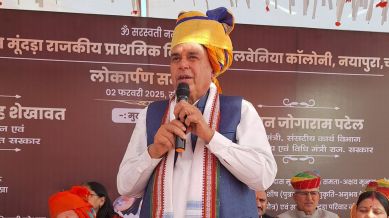Stay updated with the latest - Click here to follow us on Instagram
Cognizable and non-bailable offences with jail for 10 years – what Rajasthan’s new anti-conversion law says
Once passed, Rajasthan will join 11 other states – Odisha, Arunachal Pradesh, Gujarat, Chhattisgarh, Karnataka, Jharkhand, Haryana, Uttarakhand, Himachal Pradesh, Uttar Pradesh and Madhya Pradesh – in having an anti-conversion law.

Citing conversion of “gullible persons” through coercion, allurement or fraud, the Rajasthan government tabled the Rajasthan Prohibition of Unlawful Conversion of Religion Bill in the Assembly Monday with a maximum imprisonment of 10 years and all offences being cognizable and non-bailable.
Those converting voluntarily will have to go through a seemingly exhaustive process which includes the district administration putting up their details on a notice board to invite objections.
monthly limit of free stories.
with an Express account.
In an interview to The Indian Express last year, Rajasthan Law Minister Jogaram Patel had said the Bill is being brought to prevent forcible conversions, especially those of vulnerable communities like tribals, and also to keep a check on “love jihad”, among other things.
Once passed, Rajasthan will join 11 other states – Odisha, Arunachal Pradesh, Gujarat, Chhattisgarh, Karnataka, Jharkhand, Haryana, Uttarakhand, Himachal Pradesh, Uttar Pradesh and Madhya Pradesh – in having an anti-conversion law.
In its ‘Statement of Objects and Reasons’ for the Bill, the Bhajan Lal Sharma government said: “The Constitution confers on each individual the fundamental right to profess, practise and propagate his religion. However, the individual right to freedom of conscience and religion cannot be extended to construe a collective right to proselytize; the right to religious freedom belongs equally to the person converting and the individual sought to be converted”.
However, there have been many examples in the recent past “where gullible persons have been converted from one religion to another by misrepresentation, force, undue influence, coercion, allurement or by fraudulent means”.
“The law related to right to religious freedom already exists in various States of the country but there was no statute on the said subject in Rajasthan,” it said.
“Allurement” includes “any temptation” — including cash, material benefits, employment, free education, and better lifestyle. The Bill puts the burden of proof that a religious conversion was not done through misrepresentation, force, undue influence, coercion, allurement or by any fraudulent means or by marriage on the person who has “caused” the conversion.
With minister Patel earlier mentioning “love jihad”, the Bill also states that marriages done for “sole purpose of unlawful conversion or vice-versa” will be declared as void.
The Bill, tabled by cabinet minister Gajendra Singh, states that those in violation can be punished for 1-5 years in jail with a minimum fine of Rs 15,000. In case of conversion of a minor, a woman or a person belonging to the Scheduled Caste or Scheduled Tribe (SC/ST), the punishment will be 2-10 years with a fine of Rs 25,000. In case of mass conversions, the imprisonment would be between 3-10 years with a minimum fine of Rs 50,000, with repeat offenders facing not more than double the punishment provided under the law for each subsequent offence.
Those willing to convert will have to fill up a prescribed declaration form and submit it to the District Magistrate (DM) or the relevant authority 60 days in advance, and any violation of this would invite up to three years’ punishment and at least Rs 10,000 fine. Then, the “convertor” or the person performing the ceremony would give a month’s advance notice to the DM through a prescribed form, and violating this would invite up to five years’ imprisonment and a minimum fine of Rs 25,000.
Subsequently, an officer not below the rank of additional DM will “get an enquiry conducted through police with regard to real intention, purpose and cause of the proposed religious conversion.”
The converted person will then have to send a declaration in a prescribed form, within 60 days of conversion, to the DM. The DM will then display a copy of the declaration on the notice board of the office till the date of confirmation.
The said declaration will include the convert’s date of birth, permanent/present address, father’s/husband’s name, the religion before and after conversion, the date and place of conversion etc. Then, the convert has to appear before the DM, within 21 days from the date of filing his declaration, to establish his/her identity and confirm the contents of the declaration.
The Bill mainly empowers blood relatives to lodge an FIR. “Any aggrieved person, his/her parents, brother, sister, or any other person who is related to him/her by blood, marriage or adoption may lodge a FIR” for such conversion, the Bill states.
What the bill says:
📌 Jail term of up to 10 years
📌Cognizable and non-bailable offences
📌Burden of proof on person ‘effecting’ conversion
📌Exhaustive declaration form, including 60-day notice for voluntary conversions